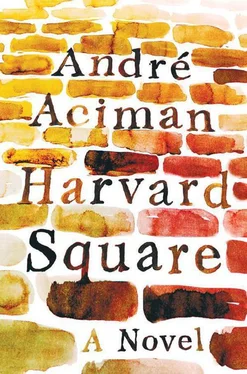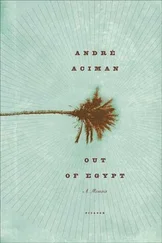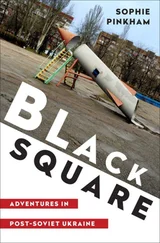Allison and I sat in the car outside my building. “Tell me what’s wrong?” she finally asked.
“Nothing,” I replied.
“I know something is wrong, very wrong, why won’t you tell me?” I hoped she wasn’t going to cry or make me feel sorry for her. I didn’t want to hate myself more than I already did.
I saw my building, and I saw my own reflection on the window of her car, and I thought of the train I’d have taken from Chestnut Hill and would probably still be on before changing at Park Square. Yes, there was plenty wrong, everything was wrong, but how could I begin to tell her when I didn’t know myself? What truth would I speak, when I didn’t even know the truth? “Is it that you don’t love me — or not enough — or not at all?” How to explain that I did love her, that of all the women I’d known, she was the one I would want to live with, and be loved by, and have children with. “I don’t want to give you up,” she finally said.
All I said in reply was “Sometimes I need to be alone.” I didn’t know I was going to say this until it had come out of my mouth.
“I thought we were happy.”
“We are.”
“Then what is it?”
I didn’t know. Like an actor who wants to sit alone in his booth after all the lights are out and everyone’s gone home, I wanted to take my time removing the makeup, the wig, the false teeth, the skin glow, the eyelashes, take time to recover myself and see the face, not the mask, not the mask again, always the mask again. I wanted to talk to myself in French, in my own French accent, speak as those who brought me into this world had taught me to speak. I was tired of English, tired of anything that didn’t smack of sea salt in the summertime and of the brine of foods prepared in our kitchens on those endless summer afternoons when the cicadas rattled like mad and time slackened and the sea beckoned, listless and sleek, through the windows of our bedrooms when we didn’t wish to nap but found ourselves lulled by the sound of the waves all the same. I was even tired of my make-believe Paris, tired of the screens I put up, tired of thinking I wore a mask, tired of longing for my face, tired of thinking it wasn’t the mask I was quarreling with, but the face — tired of fearing there’d never even been, might not ever be a face. Tired of fearing I was incapable of loving anyone or anything.
“I’m going to drive back home now. I’ll call you tomorrow. If you can’t tell me the truth, then I’ll know, and I swear I’ll never bother you again.”
She did as she promised. She called me once the next day. And then never again.
To Kalaj, when I told him what Allison had said, hers was all corporate ersatz-speak. But it was, and I knew it even then, the most honorable and most tactful behavior I’d witnessed in any woman in my life. She’d been candid and bold from start to finish. She knew what she wanted. I didn’t even know how to want, let alone what I wanted. I admired her.
As we said good night that evening, I caught myself already wishing she’d never call me the next day. I didn’t want to have the one-on-one postmortem I knew awaited us tomorrow. If to avoid that call I’d have to lose her to a fatal car accident on her way back to her parents’ house that night, so be it. I was ashamed of myself. But shame was just a metaphor, a word, nothing. In the large exchange house of the soul, it was another bankrupt word that didn’t help me get any closer to what I was feeling.
On my way to the fourth floor that night, my heart almost sank: I remembered that Kalaj would be upstairs. I caught myself making the same wish for him as well. If only they’d deport him tonight so that I wouldn’t have to explain why I wanted him out of my life. And if he and Allison were to crash into each other tonight, so much the better.
Kalaj was not upstairs. I felt for him as I pictured him cramming for his first day of teaching. I felt for Allison too, weeping, or perhaps not, as she drove all the way back to Newton tonight. And for her parents, rich and self-satisfied as they were, I felt for them too; they worried over their daughter’s crush on a man who kept ducking and slipping and leading people on like a fish who nips but never bites.
I WAS NOT READY FOR THE COLD WEATHER OF LATE fall in Cambridge. Usually I welcomed that time of year, with its early twilight and the look of bare trees against the sky and the lull that hovered over Cambridge past seven in the evening. But the late summer had been so intense that I was reluctant to see it go. Kalaj, however, fell in love with the colder weather. He put on a heavier jacket, wore a gray scarf around his neck, and would frequently walk with his hands dug deep in his coat pockets. This would be his first winter in Cambridge, and the prospect thrilled him.
In the darkening days before Thanksgiving, Kalaj would come over to consult my dictionaries and correct sheets of homework, staying up till two in the morning. It made him feel as though he too were a graduate student and that we were roommates living it out in some sort of American Bohemia. He took whatever extra jobs he could find to tide him over. Money was always scarce. But somehow we always managed, and there were days when, by one miracle or another, we could always arrange to head out to the North End and bring back food to organize a few intimate dinners with friends. When we felt we had more women than men and needed an extra male, we’d always say, by way of a joke, why not invite Count? Someone always ended up making a joke about Count Dracula and his two missing teeth.
Late that fall a group of us got together one Sunday evening to see a double feature at the Harvard Epworth Church. We paid a dollar each and saw an old film called Desire . It left us indifferent. Then we went to Casablanca, had a glass of wine each, then went home our separate ways. If Kalaj wasn’t dating someone, he’d walk back home with me. Once home he knew I’d have to read, so he made no noise whatsoever.
We each had our students. On occasion we’d compare notes. He liked that. I helped him compose his first grammar test. I then taught him how to print and collate his exams. Then I helped him determine an A from a B— from a C+. This was an altogether new world to him, and part of him, you could tell, was starstruck and awed, like an immigrant who, on board a steamship at the break of dawn, suddenly spots the first glimmers of Manhattan’s skyline. Kalaj liked the new rhythm his life had taken.
A week or so before Thanksgiving, one of the greatest shocks in his life occurred. A student had submitted Kalaj’s name to the administration. The letter arrived in care of my address. He was being invited to a teacher-student dinner at one of the river houses. What was that? Had a student lodged a complaint against him? No, it was an honor, I explained. A student invites a teacher and has a formal dinner with him, one-on-one. He thought about it for a long time. “Can I go dressed like this?” he asked. “No, you need a jacket and a tie.” He listened, all the while rolling a cigarette, staring at the tobacco without saying a word. “Oké, oké.” I felt for him. “I’ll lend you any tie you want, but my jackets won’t fit you.”
On the evening of the dinner, he knocked at my door wearing a double-breasted gray flannel suit with a light blue shirt and a dark blue tie. I recognized the Charvet tie. He saw me admiring it. “Courtesy Goodwill,” he said. But the suit was French. As was the shirt. Either he already owned the suit, the shirt, the black shoes, or he’d gone out and bought them in Boston for the occasion. Che Guevara wearing a bespoke suit. Kalaj had shaved off his mustache, combed his hair with a touch of brilliantine and looked at least seven years younger. He made me think of someone who was going to the opera for the first time. “I’ll call you when it’s all over. Maybe you’ll meet me for a drink at Maxim’s . We’ll find new women.”
Читать дальше












